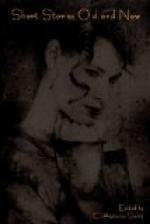But if they had been twice as many,—four times,—old Fezziwig would have been a match for them, and so would Mrs. Fezziwig. As to her, she was worthy to be his partner in every sense of the term. A positive light appeared to issue from Fezziwig’s calves. They shone in every part of the dance. You couldn’t have predicted, at any given time, what would become of ’em next. And when old Fezziwig and Mrs. Fezziwig had gone all through the dance,—advance and retire, turn your partner, bow and courtesy, cockscrew, thread the needle, and back again to your place,—Fezziwig “cut,”—cut so deftly, that he appeared to wink with his legs.
When the clock struck eleven this domestic ball broke up. Mr. and Mrs. Fezziwig took their stations, one on either side the door, and, shaking hands with every person individually as he or she went out, wished him or her a Merry Christmas. When everybody had retired but the two ’prentices, they did the same to them; and thus the cheerful voices died away, and the lads were left to their beds, which were under a counter in the back shop.
“A small matter,” said the Ghost, “to make these silly folks so full of gratitude. He has spent but a few pounds of your mortal money,—three or four perhaps. Is that so much that he deserves this praise?”
“It isn’t that,” said Scrooge, heated by the remark, and speaking unconsciously like his former, not his latter self,—“it isn’t that, Spirit. He has the power to render us happy or unhappy; to make our service light or burdensome, a pleasure or a toil. Say that his power lies in words and looks; in things so slight and insignificant that it is impossible to add and count ’em up: what then? The happiness he gives is quite as great as if it cost a fortune.”
He felt the Spirit’s glance, and stopped.
“What is the matter?”
“Nothing particular.”
“Something, I think?”
“No, no. I should like to be able to say a word or two to my clerk just now. That’s all.”
“My time grows short,” observed the Spirit. “Quick!”
This was not addressed to Scrooge, or to any one whom he could see, but it produced an immediate effect. For again he saw himself. He was older now; a man in the prime of life.
He was not alone, but sat by the side of a fair young girl in a black dress, in whose eyes there were tears.
“It matters little,” she said softly to Scrooge’s former self. “To you, very little. Another idol has displaced me; and if it can comfort you in time to come, as I would have tried to do, I have no just cause to grieve.”
“What Idol has displaced you?”
“A golden one. You fear the world too much. I have seen your nobler aspirations fall off one by one, until the master-passion, Gain, engrosses you. Have I not?”
“What then? Even if I have grown so much wiser, what then? I am not changed towards you. Have I ever sought release from our engagement?”




